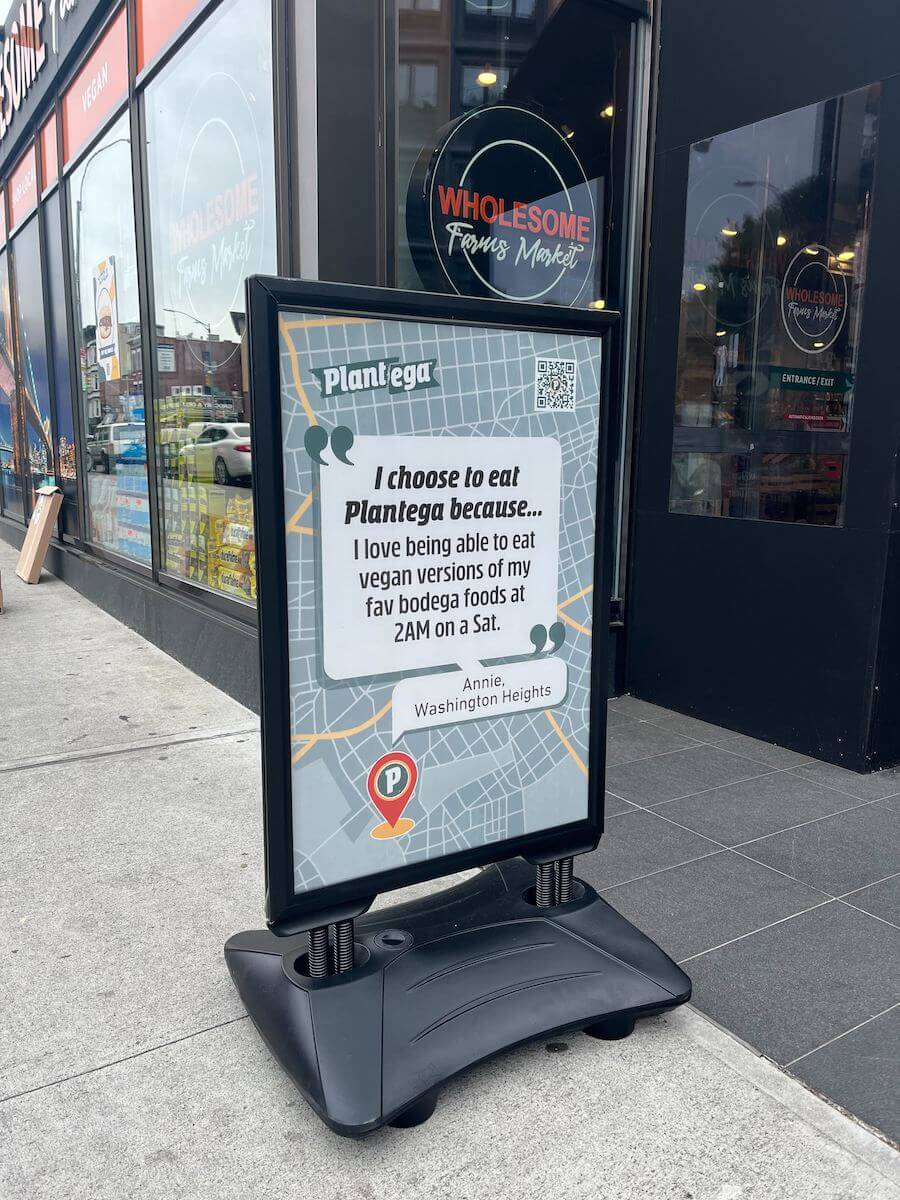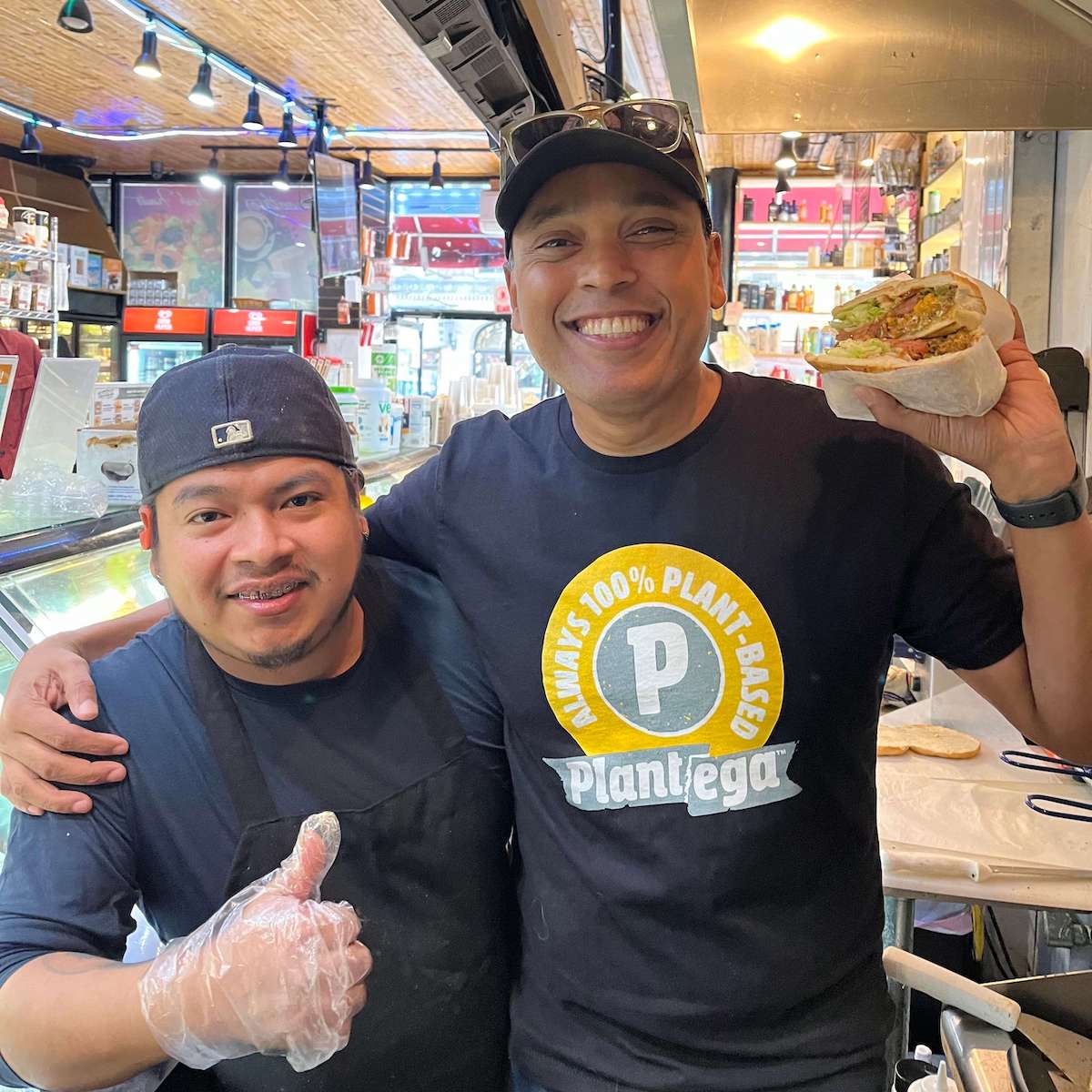Plantega leads bodegas into the plant-forward future
The humble bodega—a NYC essential. Just like all New Yorkers use the subway regardless of race, class, age, or fame, all New Yorkers rely on bodegas.
Run out of dish soap at home? Bodega. Forgot to grab a birthday present for your niece? Bodega. People might swing by to snag breakfast en route to work, go there for their lunch break, or nab a 2am snack. Defined as a small, owner-operated convenience store, bodegas play a big role in the Big Apple’s urban landscape; open late and usually multicultural, they’re a trusty corner store where you can get almost anything you need at almost any time of day—a must-have in the “City That Never Sleeps.” An estimated 14,000 exist in the City, half of which prepare hot food in their own kitchens. Enter Nil Zacharias.
Zacharias is on a mission to make plant-based food easy for everyone to access. In New York City, that means bringing plant-based food to, you guessed it, bodegas. His company Plantega has brought fully vegan food menus to over 45 bodegas across the city, thanks to its unique business model. Plantega offers a turnkey solution that enables stores to prepare and sell plant-based food with a completely plug and play setup. If you’re a kitchen that has never sold plant-based food before and you have no idea what to do with it, no worries: Plantega will take care of it all. They provide the menu, they train line cooks, they install signage inside and outside. They’ll even onboard your bodega onto delivery apps under the Plantega brand name!

Photos courtesy of Plantega


A boost for plant-based brands
Ensuring bodegas stick with it long-term requires that they be fully empowered, so Zacharias also sets up store owners with Plantega’s food distributor and facilitates inventory management and ordering; that way, the bodega can just text or call to order products as needed. This, of course, is a wonderful arrangement for the bodegas, but arguably the real winners are the manufacturers. In partnering with plant-based food companies, Plantega provides a suite of opportunities for emerging brands, namely a new distribution channel and generous marketing. Instantly putting products in 45+ kitchens at once is a huge boost for any company, all the more so for those who’ve never penetrated the NYC market. Plantega’s menu very deliberately features branded “meats” and “cheeses” front and center, publicly naming Vertage, WayFare, Daring, etc. on posters, signage, and social media, not to mention the additional publicity gained from special sampling events.
“From a brand’s perspective, they’re getting consumer trial, they’re getting distribution, they’re getting authentic marketing and consumer engagement, as well as actionable data in terms of sales, and it really helps set up a good platform for them to launch and scale their products,” says Zacharias,
“and that’s important because a few of our brands actually are not even available in grocery stores right now. Some of them are available only in foodservice. So from their perspective, [we offer] invaluable tools and data to inform product decisions and take back to their investors.”
Familiar flavors drive success
Plantega feeds these startups logistical assistance with a foodservice launch…and customers are eating it up. From a chopped cheese to a meatball sub, New Yorkers love Plantega’s offerings, its plant-based sandwiches outselling the meat-based originals at some locations. “If we hadn’t told them, they wouldn’t know it was plant-based! They didn’t know a plant-based version could taste exactly like their favorites.” By all accounts the food tastes great, but more importantly it’s familiar—comforting favorites found in the same setting that customers already frequent. In this way, Plantega is upending stereotype after stereotype. Plant-based food can taste delicious, and it’s for everyone, not just a certain economic bracket or demographic. Their sandwiches are not exclusively for vegans; in fact, most Plantega customers are omnivores!
“We believe plant-based food is for everyone. You don’t have to be part of a special club. You don’t have to wear ‘plant-based’ as an identity. A lot of plant-based food is very health-forward, but I think we’re showing that plant-based food can be culturally integrated into what you’re typically used to eating. You can eat the food that you love and grew up eating.”

Plantega sandwich samples using Karana and Zero Egg products
That notion of cultural relevance is the very cornerstone of Plantega’s mission. Many plant-based advocates try to sway consumers with facts and arguments, but Zacharias believes it’s more effective to go after people’s mouths and memories.
“Decisions around food choices are more emotional than theoretical. People make food choices because of habit, because of culture, because of memories they have with loved ones. You’ve got to first connect with their emotional and cultural touchpoints before you can dig deeper into plant-based [food]’s other benefits, like its positive impact on the environment or health.”
With Plantega, people don’t have to abandon their cultural and social reasons for eating. No one orders a cheeseburger to be healthy; they order a burger because it tastes good, and they know it tastes good because they’ve eaten burgers hundreds of times before. Cheeseburgers are meaningful to millions of people, and no matter how many facts consumers read about their harms, cheeseburgers will continue to be meaningful.
“Choice is not a privilege that everyone shares. And I think that’s the fallacy of the sustainable food movement over the last several decades where we think, ‘If only people were told the facts they would choose better,’ but that assumes that everyone has the privilege of that choice. And I think for the most part, we don’t stop to think about how most people’s choices are not dictated by the level of knowledge or understanding they have of the issues but more based on the circumstances in which they find themselves and the environment in which they consume food. Information is important. But if we don’t back that up with systems change that transforms the environment in which food is sold and consumed, we’re going to fail.”
Nudging consumers to choose plant-based
Plantega’s solution? Make it easier for people to make the right choice by flipping beloved dishes’ ingredients to plant-based. The “systems change” in this case means sourcing vegan ingredients behind the scenes by partnering directly with food manufacturers, before any food even gets delivered to a bodega. Architect every little decision leading up to the meal, so that by the time consumers are presented with a choice, they are excited to choose plant-based, and by doing so accidentally choose the sustainable, humane, healthier option. The burden shouldn’t be entirely on consumers to be ethical but also on stakeholders that control the food system, and Nil Zacharias wants Plantega to be the friendly hand that nudges people toward plant-based.
With its expansive menu of delicious and attractive classics, Plantega is doing just that. It’s teaching people that plant-based food can be indulgent. And by stocking its sandwiches in bodegas, Plantega is tapping into New York’s local culture, in all its diversity and complexity. Bodegas are the norm. Eating bodega food is an everyday occurrence. Now, thanks to Plantega, New Yorkers have the freedom to dabble in plant-based food, going about their usual business as Nil Zacharias demystifies veganism, one sandwich at a time.
Want a taste of Plantega at home? Try the recipe for Plantega’s Philly Meatball Sub.